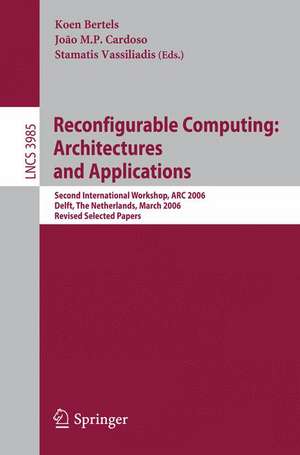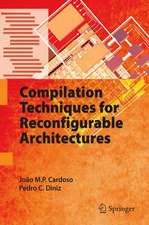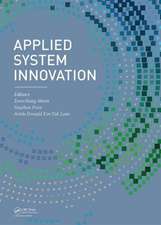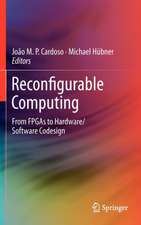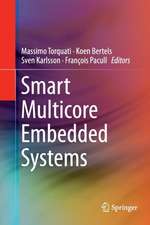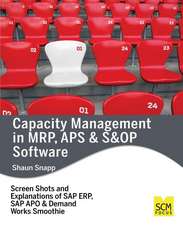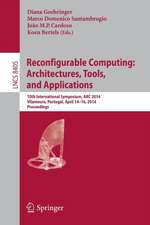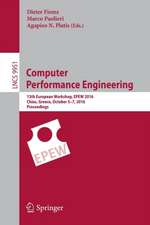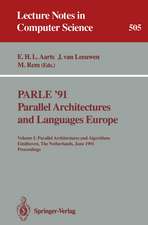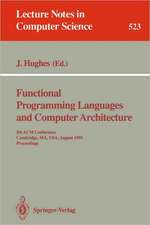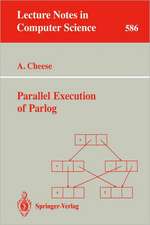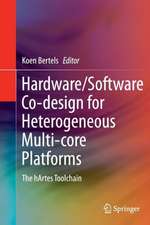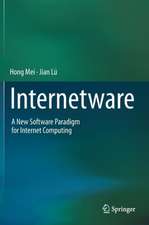Reconfigurable Computing: Architectures and Applications: Second International Workshop, ARC 2006, Delft, The Netherlands, March 1-3, 2006 Revised Selected Papers: Lecture Notes in Computer Science, cartea 3985
Editat de Koen Bertels, João M.P. Cardoso, Stamatis Vassiliadisen Limba Engleză Paperback – 26 iul 2006
Din seria Lecture Notes in Computer Science
- 20%
 Preț: 1061.55 lei
Preț: 1061.55 lei - 20%
 Preț: 307.71 lei
Preț: 307.71 lei - 20%
 Preț: 438.69 lei
Preț: 438.69 lei - 20%
 Preț: 645.28 lei
Preț: 645.28 lei -
 Preț: 410.88 lei
Preț: 410.88 lei - 15%
 Preț: 580.46 lei
Preț: 580.46 lei - 17%
 Preț: 427.22 lei
Preț: 427.22 lei - 20%
 Preț: 596.46 lei
Preț: 596.46 lei -
 Preț: 449.57 lei
Preț: 449.57 lei - 20%
 Preț: 353.50 lei
Preț: 353.50 lei - 20%
 Preț: 1414.79 lei
Preț: 1414.79 lei - 20%
 Preț: 309.90 lei
Preț: 309.90 lei - 20%
 Preț: 583.40 lei
Preț: 583.40 lei - 20%
 Preț: 1075.26 lei
Preț: 1075.26 lei - 20%
 Preț: 310.26 lei
Preț: 310.26 lei - 20%
 Preț: 655.02 lei
Preț: 655.02 lei - 20%
 Preț: 580.93 lei
Preț: 580.93 lei - 20%
 Preț: 340.32 lei
Preț: 340.32 lei - 18%
 Preț: 938.83 lei
Preț: 938.83 lei - 20%
 Preț: 591.51 lei
Preț: 591.51 lei - 15%
 Preț: 438.59 lei
Preț: 438.59 lei - 20%
 Preț: 337.00 lei
Preț: 337.00 lei -
 Preț: 389.48 lei
Preț: 389.48 lei - 20%
 Preț: 607.39 lei
Preț: 607.39 lei - 20%
 Preț: 1024.44 lei
Preț: 1024.44 lei - 20%
 Preț: 579.30 lei
Preț: 579.30 lei - 20%
 Preț: 763.23 lei
Preț: 763.23 lei - 20%
 Preț: 453.32 lei
Preț: 453.32 lei - 20%
 Preț: 575.48 lei
Preț: 575.48 lei - 20%
 Preț: 585.88 lei
Preț: 585.88 lei - 20%
 Preț: 825.93 lei
Preț: 825.93 lei - 20%
 Preț: 763.23 lei
Preț: 763.23 lei - 17%
 Preț: 360.19 lei
Preț: 360.19 lei - 20%
 Preț: 1183.14 lei
Preț: 1183.14 lei - 20%
 Preț: 340.32 lei
Preț: 340.32 lei - 20%
 Preț: 504.57 lei
Preț: 504.57 lei - 20%
 Preț: 369.12 lei
Preț: 369.12 lei - 20%
 Preț: 583.40 lei
Preț: 583.40 lei - 20%
 Preț: 343.62 lei
Preț: 343.62 lei - 20%
 Preț: 350.21 lei
Preț: 350.21 lei - 20%
 Preț: 764.89 lei
Preț: 764.89 lei - 20%
 Preț: 583.40 lei
Preț: 583.40 lei - 20%
 Preț: 649.49 lei
Preț: 649.49 lei - 20%
 Preț: 341.95 lei
Preț: 341.95 lei - 20%
 Preț: 238.01 lei
Preț: 238.01 lei - 20%
 Preț: 538.29 lei
Preț: 538.29 lei
Preț: 343.12 lei
Preț vechi: 428.89 lei
-20% Nou
Puncte Express: 515
Preț estimativ în valută:
65.65€ • 68.73$ • 54.33£
65.65€ • 68.73$ • 54.33£
Carte tipărită la comandă
Livrare economică 05-19 aprilie
Preluare comenzi: 021 569.72.76
Specificații
ISBN-13: 9783540367086
ISBN-10: 354036708X
Pagini: 492
Ilustrații: XVI, 469 p.
Dimensiuni: 155 x 235 x 30 mm
Greutate: 0.71 kg
Ediția:2006
Editura: Springer Berlin, Heidelberg
Colecția Springer
Seriile Lecture Notes in Computer Science, Theoretical Computer Science and General Issues
Locul publicării:Berlin, Heidelberg, Germany
ISBN-10: 354036708X
Pagini: 492
Ilustrații: XVI, 469 p.
Dimensiuni: 155 x 235 x 30 mm
Greutate: 0.71 kg
Ediția:2006
Editura: Springer Berlin, Heidelberg
Colecția Springer
Seriile Lecture Notes in Computer Science, Theoretical Computer Science and General Issues
Locul publicării:Berlin, Heidelberg, Germany
Public țintă
ResearchCuprins
Applications.- Implementation of Realtime and Highspeed Phase Detector on FPGA.- Case Study: Implementation of a Virtual Instrument on a Dynamically Reconfigurable Platform.- Configurable Embedded Core for Controlling Electro-Mechanical Systems.- Evaluation of a Locomotion Algorithm for Worm-Like Robots on FPGA-Embedded Processors.- Dynamic Partial Reconfigurable FIR Filter Design.- Event-Driven Simulation Engine for Spiking Neural Networks on a Chip.- Towards an Optimal Implementation of MLP in FPGA.- Power.- Energy Consumption for Transport of Control Information on a Segmented Software-Controlled Communication Architecture.- Quality Driven Dynamic Low Power Reconfiguration of Handhelds.- An Efficient Estimation Method of Dynamic Power Dissipation on VLSI Interconnects.- Image Processing.- Highly Paralellized Architecture for Image Motion Estimation.- Design Exploration of a Video Pre-processor for an FPGA Based SoC.- QUKU: A Fast Run Time Reconfigurable Platform for Image Edge Detection.- Applications of Small-Scale Reconfigurability to Graphics Processors.- An Embedded Multi-camera System for Simultaneous Localization and Mapping.- Performance/Cost Trade-Off Evaluation for the DCT Implementation on the Dynamically Reconfigurable Processor.- Trigonometric Computing Embedded in a Dynamically Reconfigurable CORDIC System-on-Chip.- Handel-C Design Enhancement for FPGA-Based DV Decoder.- Run-Time Resources Management on Coarse Grained, Packet-Switching Reconfigurable Architecture: A Case Study Through the APACHES’ Platform.- A New VLSI Architecture of Lifting-Based DWT.- Architecture Based on FPGA’s for Real-Time Image Processing.- Real Time Image Processing on a Portable Aid Device for Low Vision Patients.- General Purpose Real-Time Image Segmentation System.-Organization and Architecture.- Implementation of LPM Address Generators on FPGAs.- Self Reconfiguring EPIC Soft Core Processors.- Constant Complexity Management of 2D HW Multitasking in Run-Time Reconfigurable FPGAs.- Area/Performance Improvement of NoC Architectures.- Implementation of Inner Product Architecture for Increased Flexibility in Bitwidths of Input Array.- A Flexible Multi-port Caching Scheme for Reconfigurable Platforms.- Enhancing a Reconfigurable Instruction Set Processor with Partial Predication and Virtual Opcode Support.- A Reconfigurable Data Cache for Adaptive Processors.- The Emergence of Non-von Neumann Processors.- Scheduling Reconfiguration Activities of Run-Time Reconfigurable RTOS Using an Aperiodic Task Server.- A New Approach to Assess Defragmentation Strategies in Dynamically Reconfigurable FPGAs.- A 1,632 Gate-Count Zero-Overhead Dynamic Optically Reconfigurable Gate Array VLSI.- PISC: Polymorphic Instruction Set Computers.- Networks and Communication.- Generic Network Interfaces for Plug and Play NoC Based Architecture.- Providing QoS Guarantees in a NoC by Virtual Channel Reservation.- Efficient Floating-Point Implementation of High-Order (N)LMS Adaptive Filters in FPGA.- A Reconfigurable Architecture for MIMO Square Root Decoder.- Security.- Time-Memory Trade-Off Attack on FPGA Platforms: UNIX Password Cracking.- Updates on the Security of FPGAs Against Power Analysis Attacks.- Reconfigurable Modular Arithmetic Logic Unit for High-Performance Public-Key Cryptosystems.- FPGA Implementation of a GF(2 m ) Tate Pairing Architecture.- Iterative Modular Division over GF(2 m ): Novel Algorithm and Implementations on FPGA.- Mobile Fingerprint Identification Using a Hardware Accelerated Biometric Service Provider.- UNITE: Uniform Hardware-BasedNetwork Intrusion deTection Engine.- Tools.- Impact of Loop Unrolling on Area, Throughput and Clock Frequency in ROCCC: C to VHDL Compiler for FPGAs.- Automatic Compilation Framework for Bloom Filter Based Intrusion Detection.- A Basic Data Routing Model for a Coarse-Grain Reconfigurable Hardware.- Hardware and a Tool Chain for ADRES.- Integrating Custom Instruction Specifications into C Development Processes.- A Compiler-Oriented Architecture Description for Reconfigurable Systems.- Dynamic Instruction Merging and a Reconfigurable Array: Dataflow Execution with Software Compatibility.- High-Level Synthesis Using SPARK and Systolic Array.- Super Semi-systolic Array-Based Application-Specific PLD Architecture.
